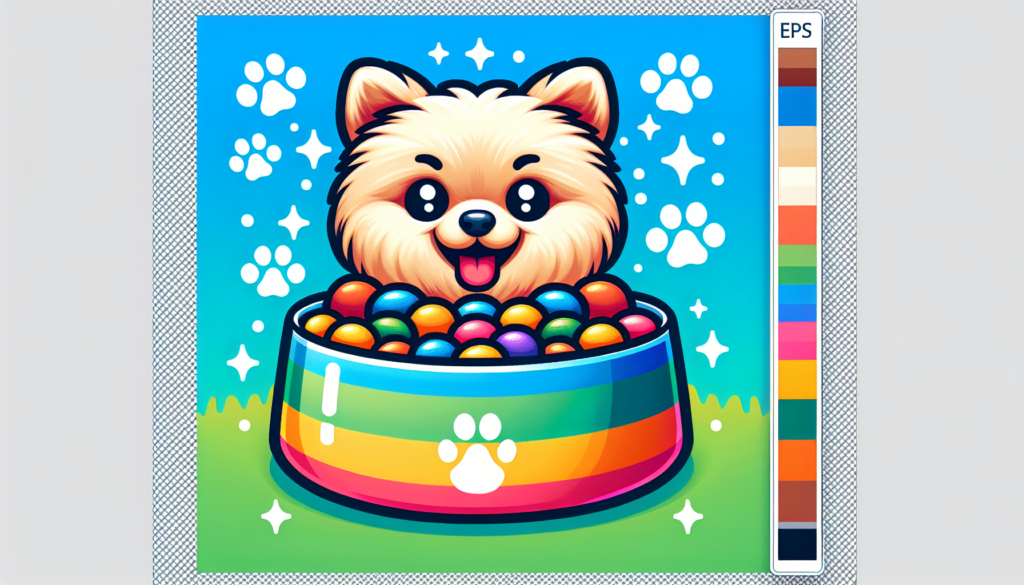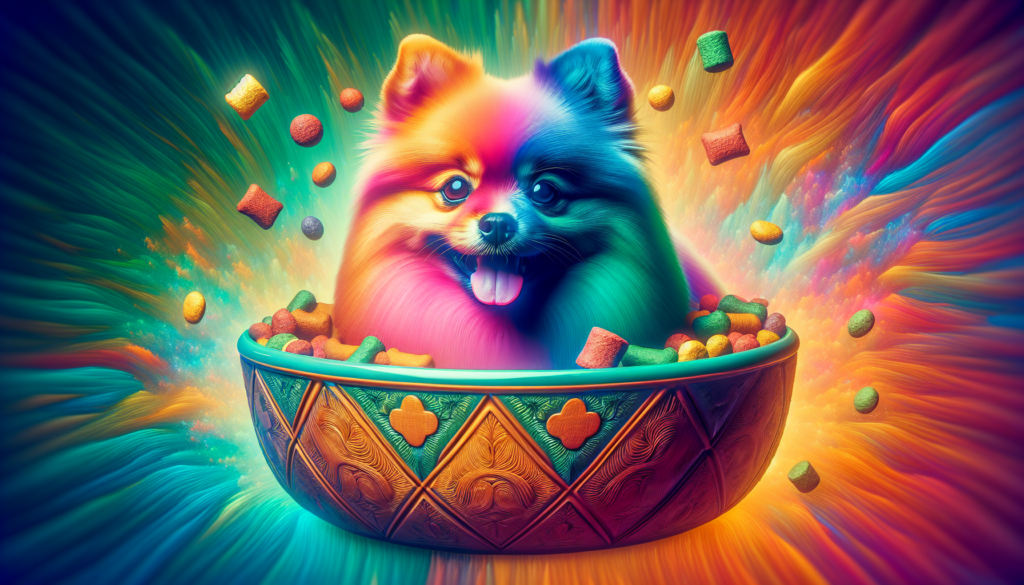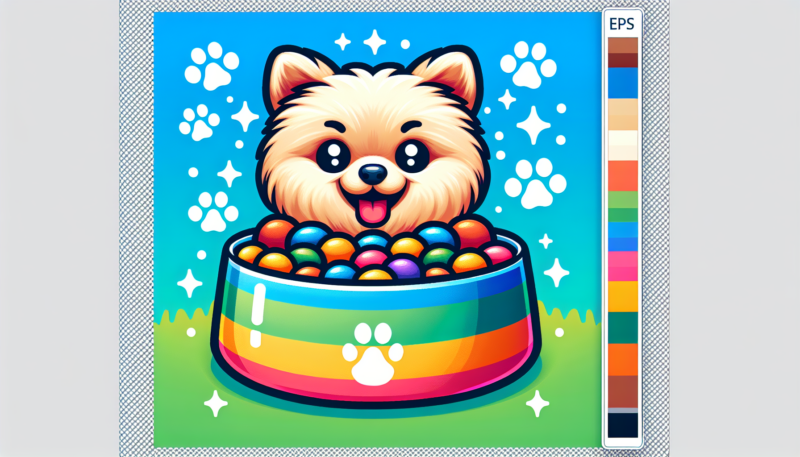If you’re the proud owner of a vibrant and lovable Pomeranian, then you know just how important it is to provide your furry friend with the best diet possible. Pomeranians may be small in size, but they have big appetites and specific nutritional needs that you need to meet. In this article, you’ll discover the key to maintaining a healthy and happy Pomeranian by exploring the best diet options for your adorable companion. From discussing the ideal food choices to addressing common dietary concerns, we’ll provide you with expert advice so that you can ensure your Pomeranian receives the nutrition they need to thrive.
The Best Diet for Pomeranians
Understanding the Nutritional Needs of Pomeranians
Before diving into the different types of diets and commercial dog food options for Pomeranians, it’s important to understand their specific nutritional needs. Pomeranians are a small breed of dog that requires a balanced diet to maintain their health and wellbeing.
Pomeranian Breed Overview: Pomeranians are known for their fluffy coats and small size. Despite their small stature, they are energetic and require a diet that provides them with the necessary nutrients to support their active lifestyles.
Small Breed Nutritional Requirements: As a small breed, Pomeranians have different nutritional requirements compared to larger dogs. They have a faster metabolism and higher energy needs, which means they require a diet that is higher in calories but still balanced in nutrients.
Protein: Protein is an essential nutrient for Pomeranians and should make up a significant portion of their diet. It helps support muscle growth and repair, as well as providing energy. Good sources of protein for Pomeranians include lean meats like chicken, turkey, and fish.
Fats: Fats are another important component of a Pomeranian’s diet. They provide essential fatty acids that support healthy skin and coat, as well as being a concentrated source of energy. Healthy fats can be found in sources like fish oil, flaxseed, and chicken fat.
Carbohydrates: While Pomeranians have higher energy needs, they also require a balance of carbohydrates for sustained energy. Good sources of carbohydrates for Pomeranians include whole grains, fruits, and vegetables.
Vitamins and Minerals: Pomeranians need a variety of vitamins and minerals to support their overall health. These can be obtained through a well-rounded diet that includes a variety of fruits, vegetables, and high-quality dog food.
Consulting with a Veterinarian
When it comes to determining the best diet for your Pomeranian, it’s important to consult with a veterinarian. They can provide valuable guidance and recommendations based on your individual dog’s needs.
Importance of Veterinary Guidance: Veterinarians are trained experts in animal nutrition and can provide the most accurate and up-to-date information on Pomeranian diets. They can assess your dog’s health, activity level, and any specific dietary requirements they may have.
Health Assessment and Dietary Recommendations: During a consultation with a veterinarian, they will perform a health assessment on your Pomeranian. This may include examining their weight, coat condition, and overall wellbeing. Based on their findings, they can provide specific dietary recommendations tailored to your dog.
Finding a Reputable Veterinarian: When seeking guidance from a veterinarian, it’s important to find one who has experience with small breed dogs like Pomeranians. Look for a veterinarian who is knowledgeable about Pomeranian nutrition and has a good reputation within the community.

Choosing the Right Type of Diet
Now that you have a better understanding of the nutritional needs of Pomeranians and the importance of veterinary guidance, it’s time to choose the right type of diet for your furry friend. There are several options available, each with its own benefits and drawbacks.
Different Diet Options:
-
Commercial Dog Food: This is a convenient and popular option for many dog owners. It typically comes in the form of dry, wet, semi-moist, or raw food.
-
Homemade Diets: Some owners prefer to prepare homemade meals for their Pomeranians, giving them full control over the ingredients and portion sizes.
-
Combination Diets: This involves a mix of commercial dog food and homemade meals, providing a balance between convenience and customization.
Benefits and Drawbacks of Each Type: Commercial Dog Food:
- Benefits: Convenient, balanced nutrition, easy to store and serve.
- Drawbacks: Can contain additives and fillers, limited control over ingredients.
Homemade Diets:
- Benefits: Complete control over ingredients, potential for customization.
- Drawbacks: Requires time and effort to prepare, risk of nutrient imbalances if not properly formulated.
Combination Diets:
- Benefits: Balance between convenience and customization, opportunity to include fresh, homemade ingredients.
- Drawbacks: Requires careful planning and monitoring to ensure nutritional balance.
Considerations for Pomeranians: When choosing a diet for your Pomeranian, consider their specific needs and preferences. Factors such as age, activity level, and any existing health conditions should be taken into account. Consulting with a veterinarian can help you make an informed decision.
Commercial Dog Food Options
If you decide to go with commercial dog food for your Pomeranian, it’s important to understand the different options available and how to choose the best one for your furry friend.
Understanding Commercial Dog Food Products: Commercial dog food comes in various forms, including dry food, wet food, semi-moist food, and raw food. Each type has its own benefits and considerations.
Reading and Understanding Labels: When purchasing commercial dog food, it’s essential to read and understand the labels. Look for high-quality ingredients, a balance of protein, fats, and carbohydrates, and the absence of artificial additives or fillers.
Finding High-Quality Brands: Not all commercial dog food brands are created equal. Look for reputable brands that have a proven track record of producing high-quality products. Reading reviews and seeking recommendations from other Pomeranian owners can be helpful in finding the right brand.
Dry Food: Dry dog food is a popular option due to its convenience and longer shelf life. Look for brands that contain high-quality protein sources, healthy fats, and a balance of carbohydrates.
Wet Food: Wet dog food tends to have a higher moisture content and can be beneficial for Pomeranians who struggle to stay hydrated. It often contains higher-quality ingredients and may be more palatable for picky eaters.
Semi-Moist Food: Semi-moist dog food is often more appealing to dogs due to its softer texture and higher moisture content. However, it can be higher in sugar and preservatives, so it’s important to choose carefully.
Raw Food: Raw dog food diets have become increasingly popular in recent years. These diets usually consist of raw meats, bones, fruits, vegetables, and supplements. It’s important to consult with a veterinarian before transitioning your Pomeranian to a raw food diet, as it requires proper handling and knowledge to ensure nutritional balance and minimize health risks.
Benefits and Drawbacks of Commercial Dog Food:
- Benefits: Convenient, balanced nutrition, wide variety of options.
- Drawbacks: May contain additives and fillers, some brands may not meet nutritional needs.

Ingredients to Look for in Pomeranian Food
When choosing a Pomeranian dog food, it’s important to pay attention to the ingredients. A high-quality diet for Pomeranians should include specific types of ingredients that promote their overall health and wellbeing.
Protein Sources: Look for dog food that contains high-quality sources of protein, such as chicken, turkey, fish, or lamb. These proteins provide essential amino acids that support muscle development and overall growth.
Healthy Fats: Healthy fats are essential for a Pomeranian’s skin and coat health. Look for ingredients like fish oil, flaxseed, or chicken fat to provide the necessary fatty acids.
Quality Carbohydrates: Carbohydrates should come from whole grains, fruits, and vegetables rather than fillers like corn or wheat. These provide a source of energy and fiber for proper digestion.
Important Vitamins and Minerals: A well-rounded diet for Pomeranians should contain a variety of fruits and vegetables to provide essential vitamins and minerals. Look for ingredients like sweet potatoes, carrots, and blueberries that offer a range of nutrients.
Avoiding Harmful Additives and Fillers: When reading labels, avoid dog food that contains artificial additives, preservatives, or fillers. These can lead to digestive issues or allergic reactions in Pomeranians.
Specific Dietary Requirements for Pomeranians
As Pomeranians go through different stages of life, their nutritional needs may vary. Here are some specific dietary requirements to consider for Pomeranians at different life stages:
Age-Related Nutritional Needs: Puppies, adult Pomeranians, and senior Pomeranians have different nutritional needs. Young puppies require a higher calorie and nutrient intake to support their growth, while adult Pomeranians need a balanced diet to maintain their health. Senior Pomeranians may require fewer calories and specialized diets to support their aging bodies.
Special Considerations for Pomeranian Puppies: Pomeranian puppies have unique dietary needs as they grow and develop. They require a higher amount of protein and healthy fats to support their rapid growth and development. It’s important to choose a puppy food specifically formulated for small breeds and follow feeding guidelines provided by the manufacturer or your veterinarian.
Diet for Adult Pomeranians: Adult Pomeranians require a well-balanced diet that meets their nutritional needs while maintaining a healthy weight. It’s important to monitor their calorie intake and adjust portion sizes as needed. Consider the specific activity level and metabolism of your Pomeranian when choosing their diet.
Senior Pomeranians’ Diet: As Pomeranians age, their metabolism slows down, and they may be more prone to certain health issues. Senior Pomeranians may benefit from a diet that supports joint health, contains easily digestible ingredients, and is lower in calories to prevent obesity. Consult with your veterinarian for specific dietary recommendations for your senior Pomeranian.
Pregnant or Nursing Pomeranians’ Diet: During pregnancy and lactation, Pomeranians have increased nutritional needs to support the growth and development of their puppies. It’s important to provide them with a diet that is higher in calories, protein, and essential nutrients. Consult with your veterinarian for guidance on feeding a pregnant or nursing Pomeranian.
Allergies and Food Sensitivities: Pomeranians, like other dog breeds, can develop allergies or food sensitivities. If you suspect that your Pomeranian has an allergy or sensitivity to certain ingredients, work with your veterinarian to identify the culprit and choose an appropriate diet that avoids those triggers.
Feeding Schedule for Pomeranians
Establishing a consistent feeding schedule is important for Pomeranians. It helps regulate their digestion, prevents overeating, and ensures they receive the necessary nutrients at the right times.
Determining the Ideal Feeding Schedule: The ideal feeding schedule for your Pomeranian may depend on factors such as their age, activity level, and personal preference. Consult with your veterinarian to determine the best schedule for your dog.
Meal Frequency: Pomeranian puppies generally require more frequent meals than adult Pomeranians. As puppies, they may need to be fed three to four small meals per day. Adult Pomeranians can typically thrive with two meals per day. However, individual requirements may vary, so it’s important to adjust based on your Pomeranian’s needs.
Portions and Serving Sizes: Portion sizes should be appropriate for your Pomeranian’s size, weight, and activity level. Consult with your veterinarian to determine the ideal portion sizes for your dog. Use measuring cups to ensure accuracy and monitor your Pomeranian’s weight to make adjustments if necessary.
Feeding Puppies: Pomeranian puppies should be fed a high-quality puppy food specifically formulated for small breeds. Divide their daily portion into several small meals throughout the day to support their growth and prevent digestive issues.
Feeding Adult Pomeranians: Adult Pomeranians can generally thrive with two meals per day. Divide their daily portion into two equal meals to provide a more balanced intake of nutrients. Adjust portion sizes based on activity level and weight management goals.
Feeding Senior Pomeranians: Senior Pomeranians may benefit from smaller, more frequent meals to support digestion and maintain steady energy levels. Adjust portion sizes and meal frequency based on your senior Pomeranian’s individual needs and any age-related health conditions they may have.
Importance of Portion Control
Portion control is crucial for maintaining a Pomeranian’s weight and preventing obesity, which can lead to various health issues. Here are some considerations regarding portion control for Pomeranians:
Risks of Overfeeding: Overfeeding can lead to obesity, which puts added stress on a Pomeranian’s joints, heart, and overall health. It can also contribute to the development of other health conditions such as diabetes or pancreatitis. It’s important to monitor your Pomeranian’s weight and adjust portion sizes accordingly.
Recommended Portion Sizes: The recommended portion sizes will depend on your Pomeranian’s age, weight, activity level, and overall health. Consult with your veterinarian to determine the appropriate portion sizes for your dog’s specific needs.
Adjusting Portion Sizes Based on Activity Level: Pomeranians that are more active, such as those who participate in agility training or have higher energy levels, may require larger portion sizes to meet their increased energy needs. Similarly, Pomeranians with a more sedentary lifestyle may need smaller portion sizes to prevent weight gain.
Monitoring Pomeranian’s Weight: Regularly monitoring your Pomeranian’s weight is essential for maintaining their health. Keep track of their weight and body condition score and consult with your veterinarian if you notice any concerning changes. Adjust portion sizes as needed to achieve or maintain a healthy weight.
Avoiding Harmful Foods
Just like with any dog breed, there are certain human foods that can be harmful or toxic to Pomeranians. It’s important to avoid feeding them these foods to prevent potential health issues.
Common Harmful Foods for Pomeranians:
- Chocolate: Chocolate contains theobromine, which is toxic to dogs.
- Grapes and Raisins: These fruits can cause kidney damage and failure in dogs.
- Onions and Garlic: These foods, and others in the allium family, can cause damage to a dog’s red blood cells.
- Xylitol: This artificial sweetener is toxic to dogs and can cause a sudden drop in blood sugar levels.
- Alcohol: Even small amounts of alcohol can be extremely dangerous and potentially fatal for Pomeranians.
Monitoring Your Pomeranian’s Health and Adjusting the Diet
Regularly monitoring your Pomeranian’s health is crucial for ensuring they are thriving on their chosen diet. Here are some important steps to take in monitoring and adjusting their diet as necessary:
Signs of a Healthy Pomeranian: A healthy Pomeranian should have a glossy coat, clear eyes, and healthy skin. They should also have energy, a good appetite, and maintain an appropriate weight for their size. Regular veterinary check-ups can help identify any underlying health issues that may require adjustments to their diet.
Common Health Issues in Pomeranians: Pomeranians are prone to certain health issues, such as dental problems, obesity, luxating patella (knee cap dislocation), collapsing trachea, and allergies. These health conditions may require specific dietary adjustments or considerations. Consult with your veterinarian to ensure your Pomeranian’s diet supports their overall health.
Adapting the Diet for Health Conditions: If your Pomeranian develops a health condition that requires dietary modifications, work closely with your veterinarian to develop a suitable plan. This may involve selecting specific types of dog food or adding supplements to support their health.
Revisiting the Diet with Veterinary Input: Regularly revisiting your Pomeranian’s diet with the guidance of a veterinarian is essential. As your dog ages or if any health concerns arise, adjustments may need to be made. Veterinary input can help ensure that your Pomeranian’s diet continues to meet their specific needs as they grow and change.
In conclusion, providing the best diet for your Pomeranian is essential for their overall health and wellbeing. Understanding their nutritional needs, consulting with a veterinarian, choosing the right type of diet, selecting high-quality commercial dog food, and monitoring their health are all key components in ensuring your Pomeranian thrives on a nutritious diet. By being mindful of portion control, avoiding harmful foods, and making necessary adjustments based on their stage of life and specific requirements, you can help your Pomeranian live a healthy and happy life. Remember, the best diet is one that is tailored to your individual Pomeranian’s needs and is supported by veterinary guidance.
